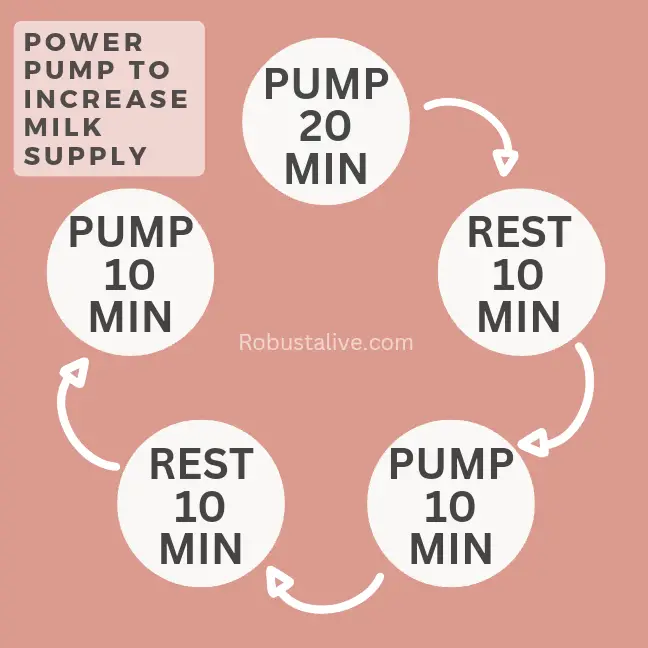How to Increase Milk Supply During Period?

Breastfeeding creates a special and essential bond between a mother and her baby. However, some mothers may notice a temporary decrease in milk supply during their menstrual period.
So, how to increase milk supply during period?
To increase milk supply during your period, breastfeed more, take calcium and magnesium supplements, pump after feeds, and use breast compressions. Also, try power pumping, stay hydrated, eat lactogenic foods, consider herbal supplements, maintain a routine, manage stress, and seek professional advice.
This article explores effective strategies that can enhance milk production while experiencing your period.
Understanding the Impact of Menstruation on Breast Milk Supply
During the menstrual cycle, hormonal fluctuations are inevitable. Two primary hormones, estrogen, and progesterone, play crucial roles in breast milk production. As menstruation approaches, these hormone levels decrease, which can temporarily reduce milk supply for some women.
Furthermore, the hormone prolactin, responsible for milk production, may also decrease before menstruation. This intricate hormonal dance often causes concerns for nursing mothers.
How To Increase Milk Supply During Your Period?
While hormonal changes during your period are natural and cannot be prevented, there are several strategies to boost your breast milk supply during this time:
Increase Breastfeeding Frequency
Supply and demand play a significant role in milk production. The more your baby nurses, the more milk your body will produce.
Aim to breastfeed on demand and increase the frequency of feedings to boost milk supply during your period. Offering the breast every 2-3 hours daily can help stimulate milk production.

Consider Calcium and Magnesium Supplements
Low calcium levels during your menstrual cycle can interfere with milk production. To counter this, consider taking a combined calcium and magnesium supplement during the days leading up to and during your period.
This can help maintain stable calcium levels in your body, which are vital for milk production.

Source: Find Your Mom Tribe
Post-Feeding Pumping
After breastfeeding, consider using a breast pump for a few additional minutes. This post-feeding pumping session can signal your body to produce more milk. Some mothers find it helpful to pump until they experience a second letdown, which can further stimulate milk production.
Utilize Breast Compressions
During breastfeeding or pumping sessions, incorporate breast compressions. Gently massaging your breasts downwards towards the nipple and on the sides while your baby feeds or your pump can help drain the breast more effectively, encouraging increased milk production.

Power Pumping
Power pumping is an effective technique to mimic cluster feeding, signaling your body to produce more milk. This involves pumping on and off for about an hour, with intervals of 20 minutes on, 10 minutes off, and so on.
While it may take a few days to see results, power pumping can help increase milk supply during your period.
Stay Hydrated
Proper hydration plays a critical role in optimizing milk production. Ensuring you drink ample water during your menstrual cycle can greatly support maintaining hydration levels, thus aiding milk production.

Source: www.nin-99.top
Incorporate Lactogenic Foods
Lactogenic foods, known for increasing milk production, can be beneficial during your period.
Include dark leafy vegetables (lettuce, kale, spinach, broccoli), dairy, fennel, fresh ginger, garlic, lean meats (beef, pork, lamb, poultry, salmon), legumes (chickpeas, lentils), nuts (almonds, cashews, walnuts, macadamia nuts), oats, barley, and whole grains in your diet to potentially boost your milk supply.
Explore Herbal Supplements
Some breastfeeding mothers find herbal supplements like fenugreek or blessed thistle helpful in increasing milk supply. However, before incorporating any supplements into your routine, it is advisable to consult with a healthcare provider or lactation consultant.
This step becomes essential if you have underlying medical conditions or are currently taking medications.
Maintain A Consistent Routine
Establishing a consistent breastfeeding or pumping routine can help signal your body to continue producing milk at a steady rate. Try to stick to a regular routine.
Skin-to-Skin Contact
Skin-to-skin contact with your baby can stimulate oxytocin release, which is essential for milk letdown. Spend quality time cuddling and bonding with your baby to encourage milk flow.
Prioritize Rest and Reduce Stress
Stress can negatively impact the milk supply. Try to get enough rest and practice relaxation techniques like meditation or gentle exercise to manage stress effectively during your period.
Track Your Period
Understanding your menstrual cycle can help you anticipate when your milk supply might dip. You can use this knowledge to increase nursing and pumping sessions a few days before your period starts, helping to maintain a stable milk supply.
Seek Professional Advice
The first and most crucial step is to discuss your concerns with your healthcare provider or a lactation consultant (LC). These experts can assess your specific situation and provide tailored guidance to enhance your milk supply.
In some cases, your GP may recommend a blood test to check your full blood count and iron levels, as anemia can negatively impact milk production.
Other Factors That Can Affect Milk Supply
Beyond the menstrual cycle, several factors can influence breast milk supply. These include:
- Poor Latching and Suckling: An improper latch or weak suckling by the baby can affect milk removal and, consequently, milk supply. Seek help from a lactation consultant to ensure a proper latch.
- Supplementing with Formula: Offering formula supplements after nursing sessions can reduce the demand for breast milk and potentially impact supply. Limit formula supplementation to medical necessity.
- Early Introduction of Solid Foods: Introducing solid foods to a baby before the recommended age of six months can decrease the frequency of breastfeeding, affecting milk supply.
- Smoking: Smoking can lead to a decreased milk supply and interfere with the letdown reflex. Reducing or quitting smoking can help mitigate this effect.
- Medications and Birth Control: Some medications, including specific birth control methods, may affect milk supply. Discuss the choice of medications or contraceptives with your healthcare provider.
- Exhaustion: Fatigue and lack of adequate rest can impact milk production. Ensure you get enough sleep, maintain a balanced diet, and stay hydrated.
Managing Menstruation While Breastfeeding
When menstruation does return while breastfeeding, it may not be entirely predictable in terms of cycle length and flow.
Some women may experience irregular periods for a while. Managing menstruation during this phase can be challenging, but here are some tips:
- Please select the right hygiene products for your comfort, whether it’s tampons, pads, or menstrual cups.
- Keep open communication with your healthcare provider. If you face heavy bleeding, severe pain, or unusual symptoms, seek their guidance to rule out any underlying problems
- Discuss suitable birth control options with your healthcare provider if you want to avoid pregnancy while breastfeeding. There are safe contraceptive methods available during this phase.
Frequently Asked Questions (FAQs)
When Do Periods Start After The C section?
Periods typically start within 6-8 weeks after a C-section if you’re not breastfeeding. Breastfeeding can delay the return of menstruation.
How Long After Stopping Breastfeeding Do Periods Return?
The return of periods after stopping breastfeeding can vary, but typically, for about one-fifth of breastfeeding parents, periods may resume within six months of giving birth. Generally, your menstrual cycle is expected to return within one to two months after you cease breastfeeding or significantly reduce nursing.
Can You Have A Period While Lactating?
Yes, you can have a period while lactating, but it’s less common due to the hormone prolactin, which often suppresses menstruation during breastfeeding. However, it’s not guaranteed, and some women may still experience periods or light spotting while nursing.
Conclusion
Experiencing fluctuations in breast milk supply during your period is common and often temporary. By following the tips we gave in this article, mothers can increase milk supply during their period.
Remember, a consistent supply of breast milk is achievable with knowledge and the right strategies, ensuring both you and your baby receive the best care during your breastfeeding journey.





